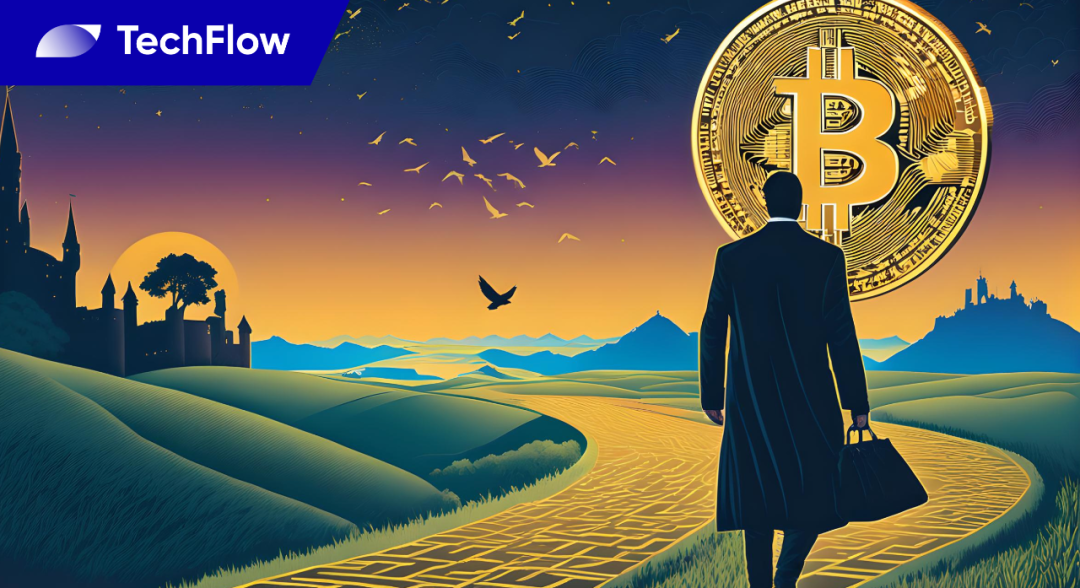In the first half of the year, there were a total of 408 blockchain application projects: 10 top fields of finance, government affairs, and traceability to the top three
Since 2019, the pace of application of blockchains in various fields has been accelerating.
According to the statistics of the Mutual Chain Pulse Research Institute, from January to June 2019, 408 blockchain application projects were disclosed globally, of which the application disclosures reached the highest peak in April and May, with the number of disclosures reaching 92 and 84 respectively. China is one of the fastest-growing countries in the blockchain business application. In the first half of this year, 184 applications were disclosed, accounting for about 45%.
In terms of industry distribution, the blockchain application project disclosed in the first half of 2018 covers more than 40 segments, but from the perspective of quantity, the blockchain application projects are mainly concentrated in the three major areas of finance, government affairs and traceability. .
According to the statistics of the Mutual Chain Pulse Research Institute, among the 408 blockchain application projects disclosed in the first half of this year, there are 228 projects in the three major areas of finance, government affairs and traceability, accounting for 55.8%.
- Facebook official announced that "will not give up Libra", Zuckerberg is determined to "block bullets" for Bitcoin
- Both are 2019, will you also recommend newbies to buy Bitcoin?
- Research Report | Digital Pass Industry Status and Blockchain Index Product Inventory
But at the same time, there are many other areas of blockchain applications that are beginning to emerge. The inter-chain pulse classifies and counts 408 blockchain application projects disclosed globally in the first half of 2019, and sorts out the top ten areas of blockchain application in 2019 for reference by industry colleagues.
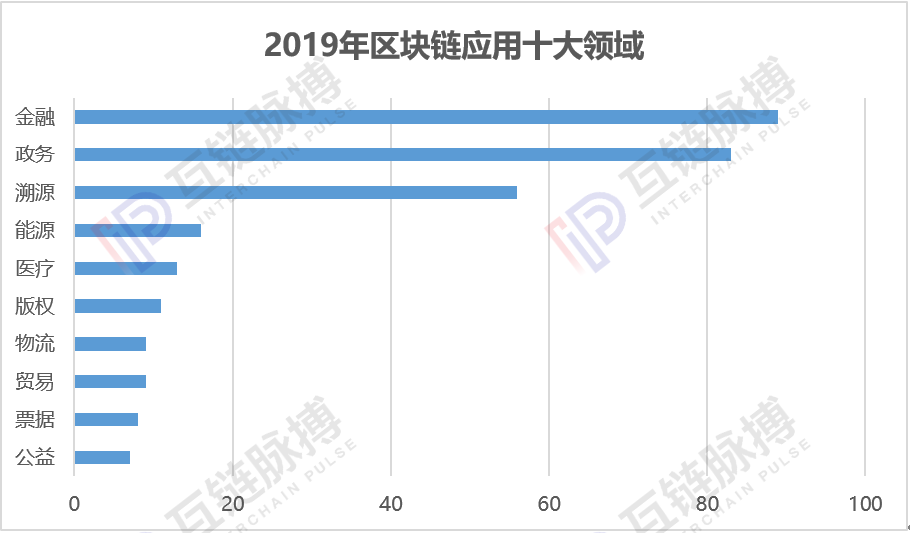
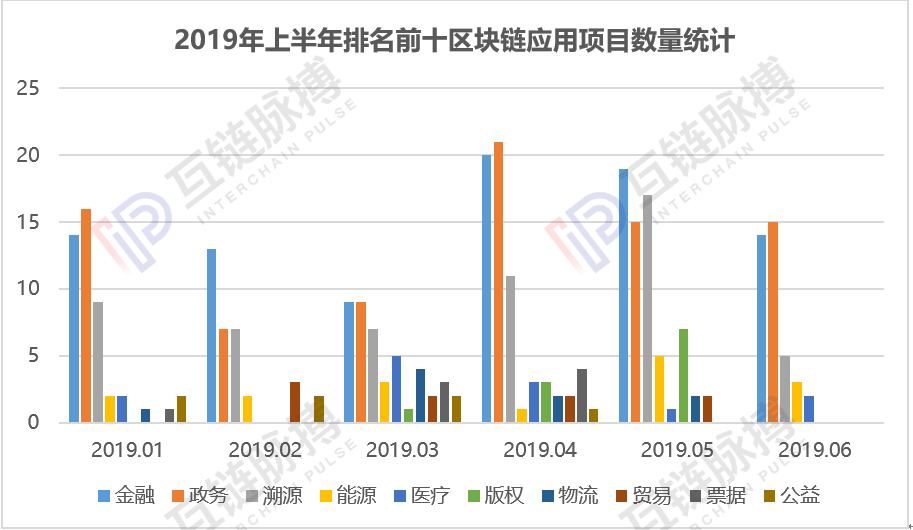
Finance, government affairs, and traceability are among the top three
Finance, government affairs and traceability have always been the main battlefields for the application of blockchain. According to statistics from the Mutual Chain Pulse Institute, in the first half of 2019, there were 89, 83, and 56 applications for blockchain finance, government affairs, and traceability, accounting for 21.8%, 20.3%, and 13.7%, respectively.
In the blockchain financial application field, cross-border payment, cross-border settlement, inter-bank transactions, and supply chain finance are the mainstream scenarios. Whether it is China's four major banks, commercial banks, or city commercial banks, they are actively promoting pilot projects for cross-border and inter-bank business blockchain platforms.
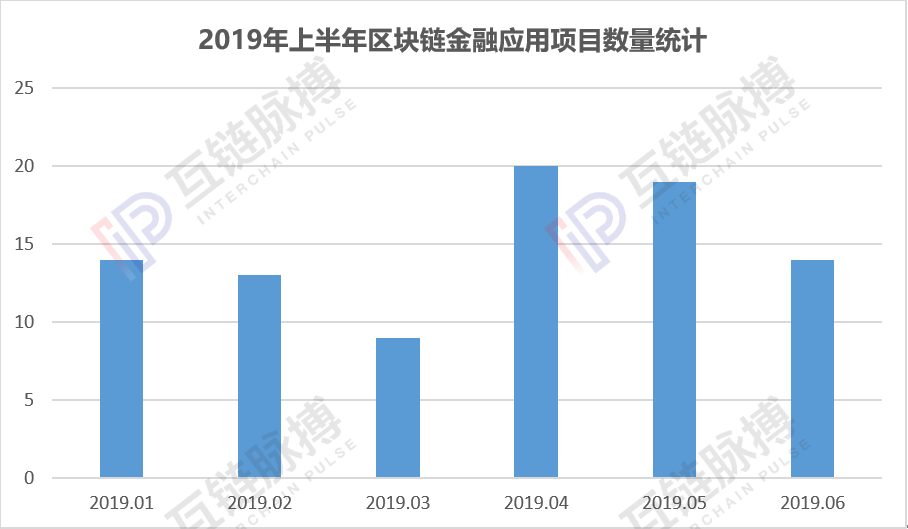
In foreign countries, in the first half of this year, HSBC, Russian Alpha Bank, and South African Standard Bank are actively using blockchain technology to promote cross-border payment and reduce the settlement cost of foreign exchange transactions. HSBC has even adopted foreign exchange through blockchain-based systems. Transaction settlement costs have been reduced by a quarter.
In the field of government affairs, China has promoted the fastest application of blockchain. In addition to blockchain electronic invoices, commercial registration, real estate information registration, and judicial depository evidence collection are becoming hotspots in the government field.
For example, the Guangdong Provincial Taxation Bureau, the Chengdu Taxation Bureau and the Shenzhen North Railway Station have made rapid progress in promoting the electronic invoices for the blockchain; Beijing relies on blockchain and other technologies to promote the “deduction of evidence and convenience” actions; Guiyang, Yunnan Yuxi and Chongqing Local governments have also accelerated the application of blockchains in convenience services by creating “network identity chain credential centers” and municipal credit information sharing platforms.
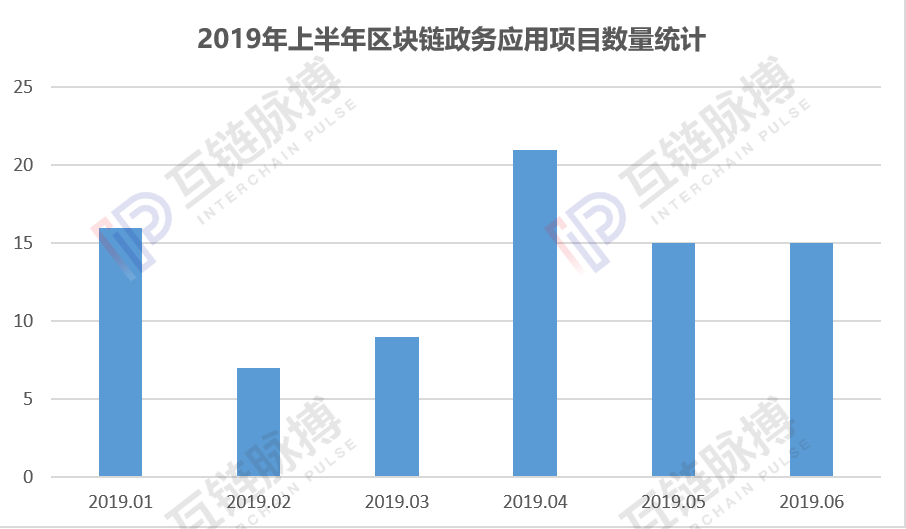
Foreign government applications mainly focus on government elections, voting, and the use of blockchain to combat tax evasion and combat money laundering. For example, the Russian ruling party, the Russian Party, has applied blockchain technology to electronic voting and counting, while the city of Denver, Colorado, also uses the blockchain system to store and track votes in municipal elections.
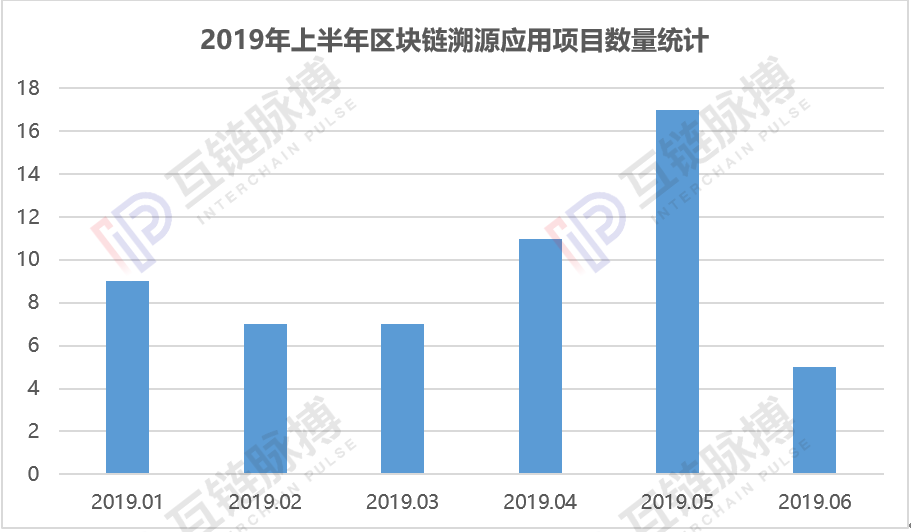
In the field of traceability, the blockchain traceability has extended from the widely used fields of food, wine, tea, coffee, cheese, etc. to precious watches, silk, and large grain commodities such as sorghum, soybeans and corn.
In the food and beverage sector, Carrefour, Shanxi “original vinegar”, Irish winery and Scottish wine company William Grant & Sons have begun to use blockchain technology for supply chain tracking and product traceability. In terms of luxury traceability, Tmall International, France LV, etc. have also launched a blockchain traceability system to trace the source of luxury goods.
Energy, medical, and copyright come later
In addition to the above three areas, the application of blockchain in energy, medical and copyright in the first half of this year has gradually increased.
According to statistics from the Mutual Chain Pulse Institute, from January to June 2019, there were 16, 13 and 11 blockchain energy projects, medical projects and copyright projects, respectively, with a total of 9.8%.
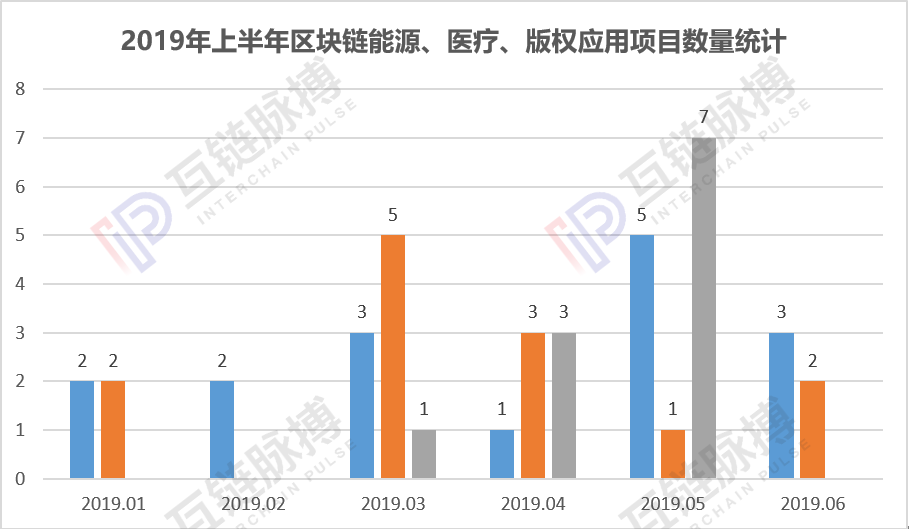
In the energy sector, the blockchain application project focuses on the power, natural gas, petroleum and other industries, especially in the power industry. Among the 16 blockchain application projects, 9 are power application projects. For example, the blockchain application platform independently developed by the State Grid, the blockchain power supply system developed by Toyota Motor of Japan, and the demonstration of residual power interpersonal trading of photovoltaic power generation in the central power utilization blockchain in Japan have all gone online or entered the testing stage.
In the medical industry, the pace of blockchain application in the first half of this year is also accelerating. From IBM's use of blockchain technology to handle sensitive medical data, drug supply and medical data exchange, to Shanghai First People's Hospital and Anhui Provincial Hospital online medical records, to pharmaceutical giant Boehringer Ingelheim and healthcare platform Solve.Care to launch diabetes care The blockchain network, and then to Ali Health, Alipay in Wuhan on the "future hospital", the blockchain in the medical field is increasingly widely used.
The copyright field is also an area where blockchain applications are developing rapidly in the first half of this year, but copyright applications are mainly domestic. For example, CCTV carried out copyright protection through blockchain technology, and China Pictures Group and Xinhuanet cooperated to launch Xinhua Image Chain and Chancheng District's “blockchain+industrial design” issued by the Chancheng District Government of Foshan. With the increasing awareness of copyright protection in China in recent years, the application of blockchain technology in the copyright field is bound to be promising.
Logistics, trade, bills, and public interest have great potential
In addition, the blockchain application projects in the four major areas of logistics, trade, bills and public welfare are gradually increasing in the first half of this year. Although in terms of quantity, the blockchain application projects in these four fields are far less than finance, government affairs and traceability, the future market potential is very worth looking forward to.
According to the statistics of the Mutual Chain Pulse Research Institute, from January to June 2019, the blockchain application projects in the four fields of logistics, trade, bills and public welfare were 9, 9, 8, and 7, respectively. About 9.8%.
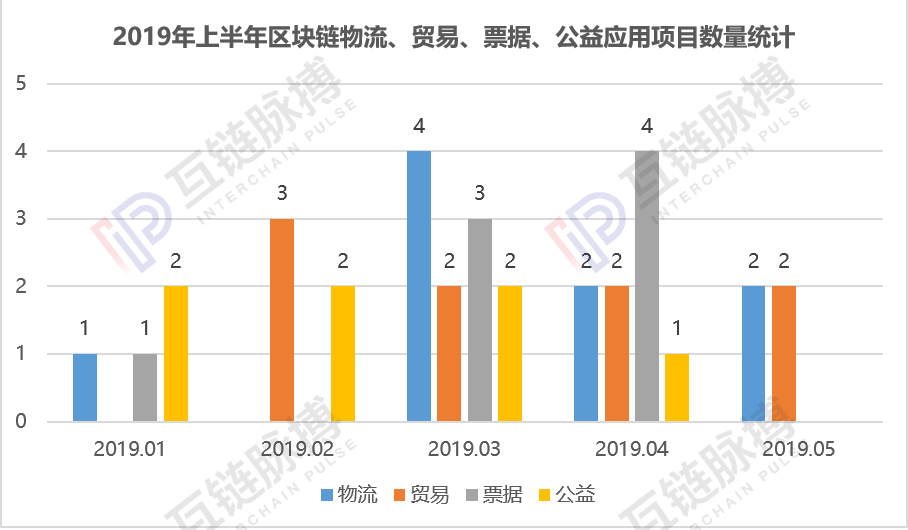
In the field of logistics and trade, blockchain applications are mainly distributed in customs, ports, ports and express logistics. In China, Hongqiao Customs has real-time supervision of the status of goods through the blockchain information system; at the Dalian Port, the “blockchain electronic delivery platform” designed and developed by Liaoning Port Group has been officially put into operation at Dalian Port; Express is on the line with the "chicken letter" feature of blockchain technology.
In foreign countries, logistics and trade blockchain projects are mainly concentrated in logistics companies. For example, US transportation and logistics giant UPS launched the blockchain platform Inxeption Zippy in the first half of this year. Singapore logistics company Cargo Community Network and Microsoft jointly launched a block-based block. Billing, costing and reconciliation systems for chain air cargo.
Blockchain bills can be said to be a successful area of domestic blockchain application pilots this year, especially in the two major cities of Shenzhen and Hangzhou. The application of blockchain electronic invoices has covered subways, parking lots, ports and banking services. field.
For example, in March, Tencent developed the first electronic rail invoice for the rail transit blockchain in Shenzhen Metro Futian Station. At the same time, Alipay and Hangzhou Metro also soon launched an electronic invoice based on blockchain technology; in April, China Merchants Bank Enterprise APP Shenzhen blockchain invoices were launched, and the first blockchain electronic invoices in the country's ports were officially launched at the China Merchants Port Shekou Container Terminal (SCT).
Finally, the public welfare sector is also an industry with more blockchain applications in the first half of this year. In China, the Southwestern University of Finance and Economics, the Communist Youth League of Chengdu, issued the first blockchain charity project in China, the “Chengqing·Public Welfare” volunteer service system; the Shanghai Jing’an District Sports Public Service Delivery Service Project was officially launched. In foreign countries, UNICEF uses blockchain technology to provide Internet access to every school in Kyrgyzstan, and IBM Research works with the non-profit organization The Freshwater Trust (TFT) to monitor groundwater in California using blockchain technology. Usage.
Author: Mutual chain pulse · Liangshan Huarong
Article source: Mutual chain pulse
We will continue to update Blocking; if you have any questions or suggestions, please contact us!
Was this article helpful?
93 out of 132 found this helpful
Related articles
- The first half of the open market financing totaled $2.59 billion behind: Algorand only ranked fifth, STO nobody cares
- [Chainge] Technical Salon Roundtable "DeFi: Decoding New Opportunities for Cross-Chain Investment"
- Why don't I recommend that you touch the "good project" of cryptocurrencies?
- Babbitt column | The most complete analysis: a clear view of Libra panorama
- Davos looks at the blockchain: Libra is hot, privacy is worrying
- Ba Shusong, chief Chinese economist at the Hong Kong Stock Exchange: Blockchain is a cure for the problem of the credit market
- Market Analysis: BTC pulls the line again, is the adjustment finished?




